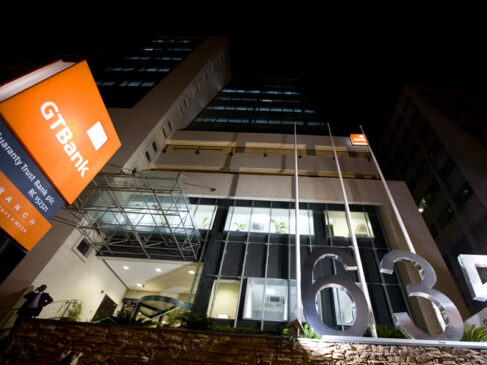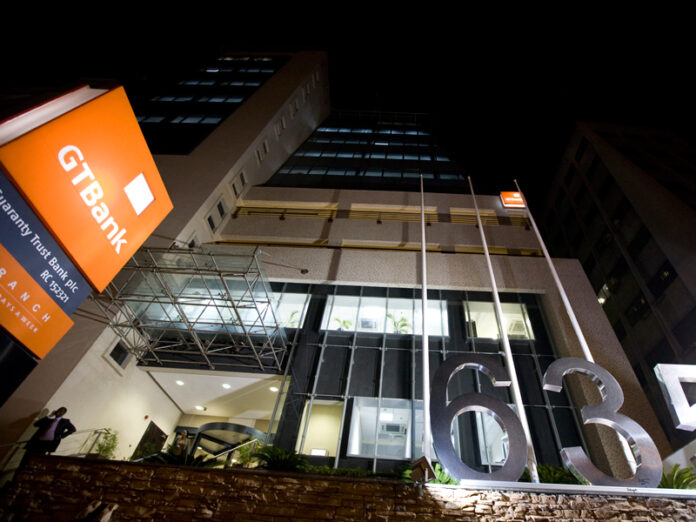Analysts Express Concern over GTB High Foreign Currency Exposure
Guaranty Trust Bank (GTB) Plc high foreign currency loans exposure is now a downside risk to the lender’s earnings expectation in 2020, and analysts have expressed concerns.
The lender’s loan book in the financial year 2019 showed that some 61% of about N1.6 trillion of the sum extended to customers were in foreign currency.
Meanwhile, making a comparison with peers in the sector, equity research analysts at Chapel Hill Denham said GTBank has least diversified loan book, based on comparative data compiled on selective banks results.
Of the GTB total loans book which settled at N1.568 trillion in 2019, foreign currency denominated loans accounted for 61% while domestic loans was just 39%.
GTBank is considered mostly among the banking community as retail bank with strong attachment to customers.
Meanwhile, analysts are of the view that the coronavirus pandemic and resultant impacts on the economy would pressure the bank’s key clients across the oil and gas sector.
Specifically, 28% of the total loans granted in 2019 were extended to upstream oil and gas clients.
Meanwhile, no Tier 1 banks dare play at the midstream oil and gas sector expect GTBank with 13% loans concentration in the sector.
Midstream operator, according to analysts remain one of the risky sector should things go awry.
Data provided by Chapel Hill Denham Research also showed that the downstream clients attracted 4% of the lender.
Chapel Hill Denham stated that economic slowdown will likely dampen repayment ability of borrowers across sectors.
“We expect this to be worse for banks oil and gas exposure given the material drop in crude oil prices”, the investment firm remarked.
Analysts said they also expect naira devaluation to be negative for assets quality from future cash flow and revaluation standpoints.
Zenith bank loans concentration has domestic taste, as 61% of N2.462 trillion credit assets were extended to local clients.
Specifically, the breakdown of the lender’s loans book shows that 25% of the sum were credit made available to manufacturing sector.
Trailing, the bank extended 16.5% of the total loans to upstream oil and gas clients while 15.9% went to government.
Stanbic IBTC showed stronger appetite for manufacturing sector’s loan, as the lender reportedly delivered 28% of the total loan book to the sector.
Total loans book was split as 55% domestics and foreign currency exposure was 45%.
Its interest in upstream settled at 14% of the total loans extended as well as 5% in oil and gas services.
Though, Chapel Hill Denham expressed that the impacts of the current macroeconomic conditions on assets will not be as damaging as 2015-2017 experience.
The firm relates this assertion to diversification of banks loan books away from vulnerable sectors and shift toward a more local currency denominated loans.
“In our view, this reflects tighter credit risk approach and measures by banks post 2014 oil price crash and 2016 recession”, analysts stated.
Chapel Hill Denham said due to the development, it has appetite for banks with well-diversified loan books by sectors and largely local denominated loans.
“On currency weighting, Zenith and Access Bank are best position with 60% and 61% of their respective loan books denominated in local currency while GTBank has the least”, Chapel Hill Denham explained.
Analysts explained that based on sector exposure, Access bank appears to have the most diversified loan book with no sector accounting for over 15% of the loan book.
Chapel Hill Denham added that the lender also has least exposure to the oil and gas sector among its coverage banks.
Analysts at Chapel Hill Denham said it is worth noting that hedging of oil and gas exposure, broadly within the $30 -60 per barrel and average of $51 per barrel, amid rising crude oil price is an upside risk for its coverage banks.
Read Also: Fidelity Bank Sets High Performance Record; Beats Analysts’ Estimates.
Oil prices have recovered in recent months, rising more than 107% from trough of $19.33 per barrel in April.
“We forecast an average oil price of $40 per barrel in 2020”, Chapel Hill Denham stated.
Stretching further, analysts stated that apart from oil and gas sector, the firm expects exposures to other key economic sectors, especially those with foreign currency facilities to see weaker assets quality in 2020.
The sectors mentioned include manufacturing, power and energy, as well as trade and general commerce.
“Sectors that will be negative impacted by lower government and business revenues such as construction, real estate , small and medium enterprises and retail could also see asset quality pressure”, analysts stated.
Meanwhile, Chapel Hill Denham said across all sectors, proactive restructuring of the loan book will be key to mitigating the impacts of weak macro variables on assets quality in 2020.
Analysts Express Concern over GTB High Foreign Currency Exposure












